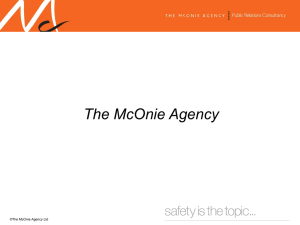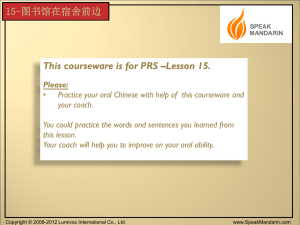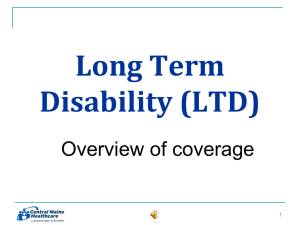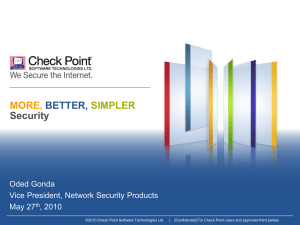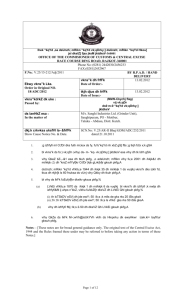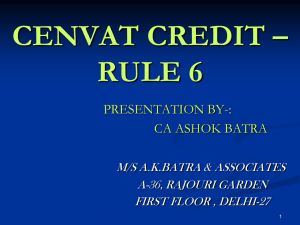1_152 - Baroda ICAI
advertisement
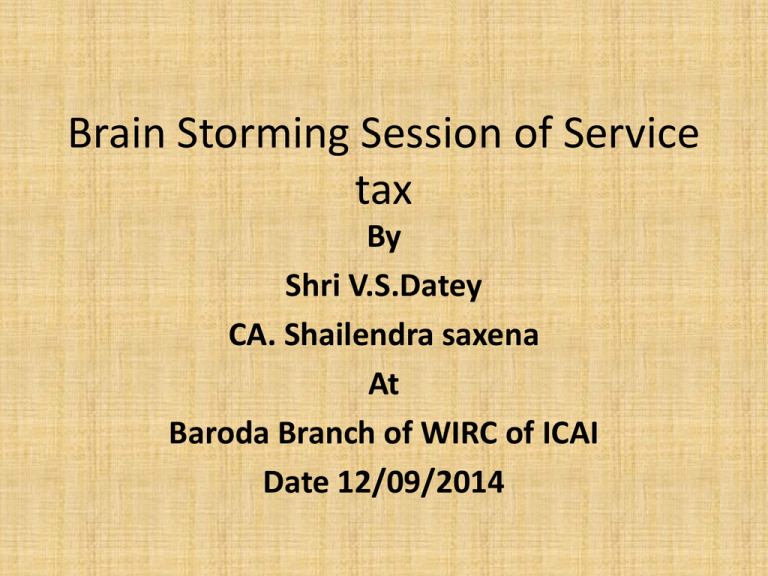
Brain Storming Session of Service tax By Shri V.S.Datey CA. Shailendra saxena At Baroda Branch of WIRC of ICAI Date 12/09/2014 1. C Ltd a company and have availed of Cenvat credit on commission agent's services for sale of their goods. C Ltd have come across a recent judgment of the Gujarat High Court in case of CCE v. Cadila Healthcare Ltd. [2013] 32 taxmann.com 105 and Astik Dyestuff (P) Ltd .v. Commissioner of Central Excise & Customs (Surat-II) [2014] 41 taxmann.com 397 (Gujarat),which has disallows said credit. Please clarify the legal position vis-à-vis the CBEC's view. Rule 2(l) allows credit on services used for clearance of final products upto the place of removal. Activity of sale promotion is specifically included. In view thereof, as per CBEC's view, credit is admissible on the services of sale of dutiable goods on commission basis - CBEC Circular No. 943/04/2011-CX, dated 29-4-2011. It has been held in Cadila Healthcare Ltd. (supra) that commission paid to agents causing sale of final products cannot be termed as an expenditure on sales promotion. Further, such commission cannot be stated to be a service used directly or indirectly in or in relation to manufacture of final products or clearance of final products from place of removal. Hence, the CENVAT credit would not be admissible in respect of commission paid to foreign agents. The judgment of the Gujarat High Court did not consider the CBEC's view on the subject. The CBEC's view was known just after the amendment to the rules w.e.f. 1-42011. Firstly, the CBEC's view represents the intention behind the definition of input service. In case of COMMISSIONER OF CENTRAL EXCISE, LUDHIANA Vs. AMBIKA OVERSEAS 2012 (25) S.T.R. 348 (P & H),this issue decided in FAVOR OF ASSESSEE. In View of Ahmedabad CESTAT Recent judgments in case of COMMISSIONER OF CENTRAL EXCISE AND SERVICE TAX, SURAT-II Vs M/s SHREE KAMREJ VIBHAG KHAND UDYOG SAHAKARI MANDLI LTD. Dated 18/07/2014 in which it was held that the first appellate authority has relied upon a chartered accountant's certificate which clearly shows the commission which has been paid by the appellant is for promoting the sale of finished goods. Hence the judgment of the Hon'ble High Court of Gujarat in the Cadila Healthcare Ltd (Supra) would cover the issue in favour of the assessee. Accordingly, C Ltd may continue taking the credit of the said services. 2.M/s Sunrise Ltd are running a multiplex theatre in a posh area of vadodara. They collect revenue from the following sources : (a) Receipts from Cinema shows ; (b) Percentage-wise share towards rental from various food shops located in the theatre ; (c) A horror show game organized by us in our premises ; and (d) Various motor rides and games organized by us in our premises. Are all or any of the sums from aforesaid services liable to service tax ? Please clarify. (a) Receipts from cinema shows: Exhibition of cinema is an entertainment event within the meaning of section 65B(24). Hence, receipts from exhibition of cinema are not liable to service tax. (b) Percentage-wise share towards This service is more appropriately described rental from various food shops located in as renting of immovable property, which is a the theatre declared service u/s 66E of the Act. Merely because the rent is based on fixed percentage-wise share, the service doesn't cease to be renting of immovable property. Hence, the said rentals are liable to service tax. (c) A horror show game organized in the Since this amounts to providing fun or premises recreation by way of games, such services are 'amusement' services falling under section 65B(9) of the Finance Act, 1994 and, therefore, not liable to service tax. (d) Various motor rides and games Since it is providing fun or recreation by way organized in the premises. of motor rides and games, such services are 'amusement' services falling under section 65B(9) of the Finance Act, 1994 and, 3. M/S Z Ltd a company and are getting their project reports printed, bound and photocopied from an outside agency (who is a non-corporate entity). For this purpose, M/s Z Ltd provide only soft copy of report to the outside agency through e-mail. The outside agency is charging Printing, photo coping and binding charges plus State VAT. whether Z Ltd should pay service tax as a service recipient under works contract service under Section 68(2) of the Finance Act, 1994, read with Notification No. 30/2012ST ? In the Indian context, the printing and binding of books/documents/reports amounts to 'manufacture of goods' and even if it is a service, it is covered under negative list entry under Section 66D(f), read with section 65B(40) of the Finance Act, 1994. If printing is carried out as an intermediate production process, then, printing is exempt from service tax under Entry 30 of Notification. No. 25/2012-ST and binding would also be exempt being a part of bundle, whose essential character is printing. It must be noted that in Mahim Patram (P.) Ltd. v. Union of India [2007] 7 STT 136 (SC) the assessee was engaged in printing of questions papers for examination boards, competitive examination boards, recruitment boards and various universities and boards. On these facts, it was held (in para 2) that the assessee had carried on a highly specialized and secretive work. Therefore, the said activities of the assessee admittedly amounted to a "works contract". By analogy, therefore, printing of reports and consequent supply of printed paper, after binding, amounted to a 'works contract'. 4. Despite being covered under reverse charge, P Pvt. Ltd a security company charged and collected 100% service tax from service receiver till 31-3-2013 and thereafter, paid to the government. From April, 2013, the company is charging 25% service tax and balance 75% is being paid by service receiver. Will there be any liability on service receiver for the period up to March 2013. If yes, what remedial action can be taken ? The security services are chargeable to service tax and, hence, tax paid, if any, cannot be regarded as paid without charge.The service tax is payable by the person who is liable to pay service tax as per section 68 and the person so liable to pay service tax falls within the definition of an 'assessee'. All obligations under the service tax law are to be complied with by the person liable to pay service tax (registration, payment, returns, etc.).A person other than 'person liable to pay service tax' can be regarded as an assessee only if such person is the agent of the person liable to pay service tax. In CST v. Landmark Automobiles (P.) Ltd. [2013] 31 taxmann.com 168 (Ahd. - CESTAT), it was held that in case of reverse charge service provider's defence that liability to pay service tax is on service recipient is sufficient to set aside demand against service provider. As per law, payment by a person other than person liable to pay service tax can be regarded as good payment only if such person is the agent of the person liable to pay service tax, i.e.,provider must be able to furnish proof that payment was made by you as an agent of the service recipient and registration must be sought/returns must be filed accordingly in the name of the service recipient. since payment has been made wrongly by Security agency and there is no revenue loss, a certificate from service provider to service recipient to this effect may avoid double payment, subject to due verification by the Department. In case of full reverse charge, it must be noted that the said service doesn't amount to an output service as per Rule 2(p) of the CENVAT Credit Rules, 2004, for the service provider. Accordingly, any wrong payment of service tax by service provider out of the Cenvat credit availed would be treated as contrary to law and the Cenvat credit in relation to those services would be denied. 5.D Ltd a Company engaged in business of exploration of oil and natural gas. They have hired services of police department for security of their key personnel. they hired services of police department for security in a publicity function organized by them. Are D Ltd liable to pay service tax ? In D Ltd view, police department is performing a sovereign function and is not liable to service tax. A. B. C. Taxable -Services provided by Government, viz., police department are excluded from the charge of service tax by virtue of section 66D(a), but support services provided to business entities are chargeable to service tax. Covered with reverse charge - Security services are support services and are liable to service tax, if provided to a business entity. As the business entity is located in taxable territory, service tax will be payable under reverse charge by the recipient of service, viz., D Ltd. should take registration and discharge service tax liability. Credit available - It appears that the said services will be 'input services' under Rule 2(l) of the CENVAT Credit Rules, 2004 and, accordingly, will be eligible for credit. Security is one of the items listed in Rule 2(l) of the CENVAT Credit Rules, 2004. If D Ltd are engaged in manufacture/provision of service and security services and have nexus with such manufacture/provision of service, it will be an input service. 6.An Indian Company's security is listed in Luxembourg Stock Exchange. The annual membership fee and listing fee are paid to the stock exchange from India. Whether the Indian Co. is liable to pay service tax on such fee? If yes, whether the company is eligible to claim Cenvat credit against service tax paid on its taxable services? Place of provision is determined according to default Rule 3 of POP Rule, and this case the place of provision of service would be based on location of recipient of service. i.e., Indian company and, therefore, the Indian company will be liable to deposit service tax on such listing fee under reverse charge mechanism. The service tax so deposited will be available as Cenvat credit to the Indian company only if there exists a nexus between such listing in Luxembourg Stock Exchange and the output services of the Indian company. 7.A Ltd. has procured convention services from five star hotel for its business activities. As a part of the package deal, the hotel provides to airport pick and drop facility, promotion material along with the conference hall. Hotel raises a single invoice for all the three activities and recovers service tax on the gross consideration. Whether A Ltd. is eligible to claim Cenvat credit of the entire service tax so paid or A Ltd. would need to proportionately reduce the Cenvat credit relating to airport transfer facility? The provision of convention services by the hotel will be considered as bundled service comprising of conference hall, promotion material and cab facility. As per section 66F of the Act, "bundled service" means a bundle of provision of various services wherein an element of provision of one service is combined with an element or elements of provision of any other service or services. If such services are bundled in the ordinary course of business, then the bundle of services is treated as consisting entirely of such service which determines the dominant nature of such a bundle. In the present case, the intention of A Ltd. is to obtain convention services and provision of cab facilities for travel to and from airport is naturally bundled with the same. Hence, A Ltd., should be eligible to claim entire Cenvat credit and there is no need to reduce the Cenvat credit in proportion to the service tax pertaining to cab services. 8.Whether Cenvat credit on telephone bills addressed in the name of the company can be claimed on the basis of the electronic invoices received via emails or the company would require original hard copy of invoices for claiming the Cenvat credit? In terms of rule 9(1) of the Credit Rules, the provider of output services can claim Cenvat credit on the telephone bills addressed in the name of the company on the basis of the 'invoice issued' by the provider of an output service. The eligibility of Cenvat credit is not dependent upon the mode of receipt of the invoice. Thus, so long as the invoice issued by the telecom company is addressed in the name of the recipient-company and all other conditions for claiming credit, such as nexus with the output service, are fulfilled the service recipient will be eligible to claim Cenvat credit. Receipt of invoice via e-mail will not disentitle the company from claiming the Cenvat credit. 9.Whether A Ltd. can claim Cenvat credit on inputs or input services or capital goods received prior to the service tax registration? A Ltd. can claim Cenvat credit on inputs or input services or capital goods received prior to obtaining service tax registration, provided eligibility criteria/tests for qualifying as inputs, input services and capital goods are met. Reference may be drawn to the following case laws: In J R Herbal Care India Ltd. v. CCE 2010 (253) ELT 321 (Trib.Delhi), it was held that there is no provision, in law, that Cenvat credit is not available to unregistered manufacturer. In Sew Construction Ltd. v. CCE [2011] 32 STT 120/12 taxmann.com 12 (CESTAT- New Delhi), demand for the period prior to registration was confirmed and it was held that the assessee would be eligible for the Cenvat credit on inputs, if that is not otherwise deniable. In CCE v. Progressive Systems [2012] 36 STT 30/22 taxmann.com 119 (Kar.), followed in Naughty Foods v. CCE [2012] 37 STT 584/27 taxmann.com 67 (Delhi - CESTAT), it was held that an SSI unit could take the Cenvat credit of capital goods received when he was not registered. He could utilise the credit when he was registered and started payment of excise duty. 10.A Ltd. is engaged in the business of manufacture of chemicals. In terms of the guidelines issued by the pollution control department, A Ltd. has installed plants in 33% of the areas and engaged B Ltd. for gardening/maintenance services of plants. Whether A Ltd. is eligible to claim Cenvat credit on such maintenance fee paid to B Ltd.? In case of certain businesses which are potentially hazardous, the manufacturing activity cannot be legally undertaken without having the requisite gardening and maintenance of greenery in the precincts of the factory in terms of applicable environmental laws. The question relates such a situation. In such a case, gardening activity will be considered as an integral part of the manufacturing process and, hence, the service tax charged by B Ltd. on maintenance/garden services will be available to A Ltd. Reference may be had to following case laws: In Brakes India v. CCE [2010] 29 STT 50 (CESTAT-Bang.) service tax paid on maintenance of garden was held as an input service, since maintenance of garden was statutorily required as per consent given by the State Pollution Control Board. In CCE v. Nirma Ltd. 2012 (277) ELT 207 (Tri. - Ahd.) it was found that the respondent's factory, being a chemical factory, was covered under the Pollution Control norms. Accordingly, the maintenance of garden, being a mandatory activity under section 25 of Water (Prevention and Control of Pollution), 1981 of the Gujarat Pollution Control Board, was held as an input service. In JBM Auto System (P.) Ltd. v. CCE [Final Order No. 763/2011, Appeal No. E/647/2010, dated 18-7-2011] it was held that the manpower service used for garden maintenance was required for infrastructure for manufacture and clearance of final products and that credit was admissible. In CCE v Voith Turbo (P.) Ltd. [Final Order Nos. 1149 & 1150/2010, dated 27-8-2010] it was held that when it was on record that the assessee had given its consent for the manufacturing of the goods in the factory premises subject to discharge of industrial and domestic effluents within the factory premises and was directed to maintain a green belt, then the service was utilized by the assessee from the experts for maintaining the garden of such type and credit could not be denied on the service tax paid on such services. Ultratech Cement Ltd., In re [Appeal Nos. P11/PAP/102-103/2009, dated 23-4-2009] it was held that services such as cleaning/maintenance of garden/trees, plantation, etc., were used to control the pollution created by the industry and, thus, the same could be considered as input services which were used in relation to the manufacture of final product, viz., cement. THANK YOU
